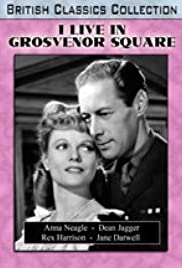
I LIVE IN GROSVENOR SQUARE
UK, 1945, 113 minutes, Black and white.
Anna Neagle, Rex Harrison, Dean Jagger, Robert Morley, Nancy Price, Irene Vanbrugh, Jane Darwell, Edward Rigby.
Directed by Herbert Wilcox.
I Live in Grosvenor Square is a patriotic film from World War Two. However, it was in production when the war in Europe ended in May 1945. It was released on 3 September, the sixth anniversary of the outbreak of the war.
The film was called A Yank in London for American audiences, Grosvenor Square being the emphasis for British audiences. It is a film about Americans in London during World War Two, especially in Grosvenor Square which was where General Eisenhower lived.
Anna Neagle is at the centre of the film, in love with Rex Harrison. However, Dean Jagger comes from the United States and she falls in love with him. The film presents a rather reserved British romantic triangle.
There is interesting support from people like Robert Morley as the Duke of Exmoor and Jane Darwell (The Grapes of Wrath) as Mrs Patterson.
Anna Neagle was very popular in England during these years and made many films, including Sixty Glorious Years and Victoria the Great with her husband, Herbert Wilcox, before the war. With the title emphasis on Grosvenor Square, it led the way to the Wilcox- Neagle romantic films with place names in London after the war: Piccadilly Incident, Spring in Park Lane, Maytime in Mayfair and The Courtneys of Curzon Street.
1. A film of the 40s, now? How dated does it seem in content, style, attitudes? A good reflection of attitudes and the history of World War II? For what audiences was it particularly made then?
2. The importance of morale for Anglo- American relationships? For the English, Americans, aspects of the development of historical relationships? The war situation, memories of World War I and American intervention? Mutual suspicion, bonds? English resentment, an occupation? American carefree attitudes? The bonds eventually leading to many marriages? The possibilities of collaboration and cooperation - bridge across the Atlantic? The final quotation from Walt Whitman?
3. How does this bridging of Anglo- American relationships seem now? The decades after the war and development in the two nations?
4. The importance of the setting in the 40s? Particularly for a British audience rather an American audience? The importance of representing wartime settings, situations, changes, the fact of death - an American death, a man that the English had got to know?
5. Black and white photography, the British style of film-making, presentation of London, traditions and drawing room comedy and melodrama? Yet the old pre-war styles venerated but also poked fun at? The presentation of England at war? Music, dancing and song styles of the 40s?
6. The focus on John Patterson and the title referring to him? The kind of American representative, type? Background of Arizona, his pre-war work and ambitions, his arrival in London and his reaction to London and the English? (The importance of the flag?) His mother, Jane Darwell playing, the role? A pleasant man, encountering the English, the people in the house, David? The club? His attitude of openness to Ma and her anti-American reaction? To Lord Exmoor and calling him Pops? The bond with David Bruce? The bond with his friend as they discovered England together? The bond with Patricia?
7. The importance of American faux Pas? English faux pas at the Americans? Mutual suspicions, ignorance, especially that of Patricia?
8. The presentation of David as a typical British type? Rex Harrison and his style? Involvement in the war, love for Patricia, the formalities and informalities of their relationship? Friendship and courtesy to John? Tennis playing, ambitions for Parliament, his campaign? The effect of his losing and his style in taking it? His losing Patricia and his anger? His hopes of regaining her and his device of linking John and Patricia by the telephone? His courtesy and thoughtfulness in coming at the time of John's death? The film ending with him and his involvement in the war? An exemplary and decent young Englishman? Convincing at the time for Anglo-American? relationship?
9. The home of Lord Exmoor, city and country homes, old style, the effect of the Americans occupying the stately homes of England, the changes inevitably wrought for the English?
10. Lord Exmoor and his personal style, Robert Morley, manners, way of working, tradition, politics? Dinner (and the old man at the hotel commenting on what would be happening?)
11. How attractive a heroine was Patricia? Anna Neagle's impact in the 40s? Her family and its tradition? Her army work and her commission? Personal style, snobbish attitude towards the Americans? Love for David, change of affection for John? The train trip with him, the outing to the club and the dancing, their outings and visits, riding on the moors? The dance on election night? Proposal, her willingness to go to Arizona? The importance of the break and the effect on her, her link with John by phone and the possibility of marriage and their future?
12. How appropriately did the film communicate the news of John's death, Patricia helping to bring him in? The list of the dead? Her reaction, David's comfort?
13. Ma and her hostility and breaking down this hostility, her then helping the Americans, her birthday party? A symbol for relationship?
14. The details of England at war, the preoccupations of the Americans' war?
15. What were the main English and American differences highlighted?
16. The morale boosting at the end of the film? The end of the war in sight? The film in retrospect?